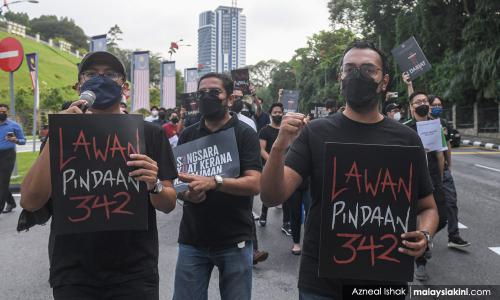LETTER | No need for such tough laws
LETTER | The proposed amendments to the Prevention and Control of Infectious Disease Act 1988 (Act 342) are too harsh and unreasonable and it smacks of a totally totalitarian approach by the government to cause fear and worry on the part of law-abiding citizens of the country.
Despite the threat of the new Covid-19 variant, Omicron, there is no need to panic as the danger is not new and we can observe many other countries that have witnessed highs and lows and the steps they took to overcome the disease.
Malaysia did not insist on such draconian laws when the pandemic broke out early last year, so why is there now a need for harsh laws for individuals and organisations? Both the Health Minister Khairy Jamaluddin and the director-general of Health Dr Noor Hisham Abdullah need to be more considerate and reasonable.
The government, too, is at fault for taking some unnecessary risks such as holding the recent Malacca polls and Sarawak state elections on December 18.
Many events have also been initiated or sponsored lately by the government and large numbers of people have gathered during them, possibly triggering further transmission of the disease.
The government should not allow any big gatherings, no matter how important the need, as the priority is to prevent Covid-19 transmission. The government needs to do its duty first instead of blaming the public or resorting to tough laws.
There is no assurance that harsher laws will stop transmission of Covid-19, just like how heavy fines may even result in an increase in graft.
It is also hoped that there will be no repetition of the mega vaccination centres for the booster jabs, which should be on a registration or appointment basis.
Despite the initial assurances of herd immunity, case numbers now hover around 5,000 even though 97 percent of the adult population have been vaccinated. The daily case numbers are similar to that of when only a small percentage of the population had been vaccinated.
This does not augur well for those who are vaccine-hesitant and anti-vaxxers as herd immunity does not seem to be able to protect the unvaccinated.
Those who opted not to be vaccinated but thought that they were protected by herd immunity are also at risk now. Anti-vaxxers may have at first thought that herd immunity would help them overcome the disease, but now that may no longer be true.
Government hospitals should now focus on vaccinating the remaining 3 percent of the adult population, numbering about 300,000, who had yet to be inoculated whenever there’s a request and not just focus on booster doses.
The government does not seem to be prioritising those who are only now registering for vaccination, and there are also foreigners who had missed out earlier for various reasons.
It will be better for the government to reintroduce strict SOPs, queue markings, social distancing, mandatory use of MySejahtera and crowd control in shopping malls, wedding halls supermarkets, houses of worship and others to prevent any new surge of Covid-19 or the spread of the omicron variant.
One can also notice that SOP compliance has become somewhat lax, and it is here that the government needs to show its seriousness through enforcement instead of imposing inordinate fines and punitive action.
The existing fines were good enough to control the pandemic and there is no need for draconian laws as proposed by the Health Ministry. Laws can be amended in the future if there is an urgent need and looming danger of Covid-19’s resurgence.
If the nation could impose unprecedented lockdowns, will it not impose harsher laws when there is an absolute need? Malaysian citizens are reasonable and will accept tough measures when the time comes.
The views expressed here are those of the author/contributor and do not necessarily represent the views of Malaysiakini.
RM12.50 / month
- Unlimited access to award-winning journalism
- Comment and share your opinions on all our articles
- Gift interesting stories to your friends
- Tax deductable
